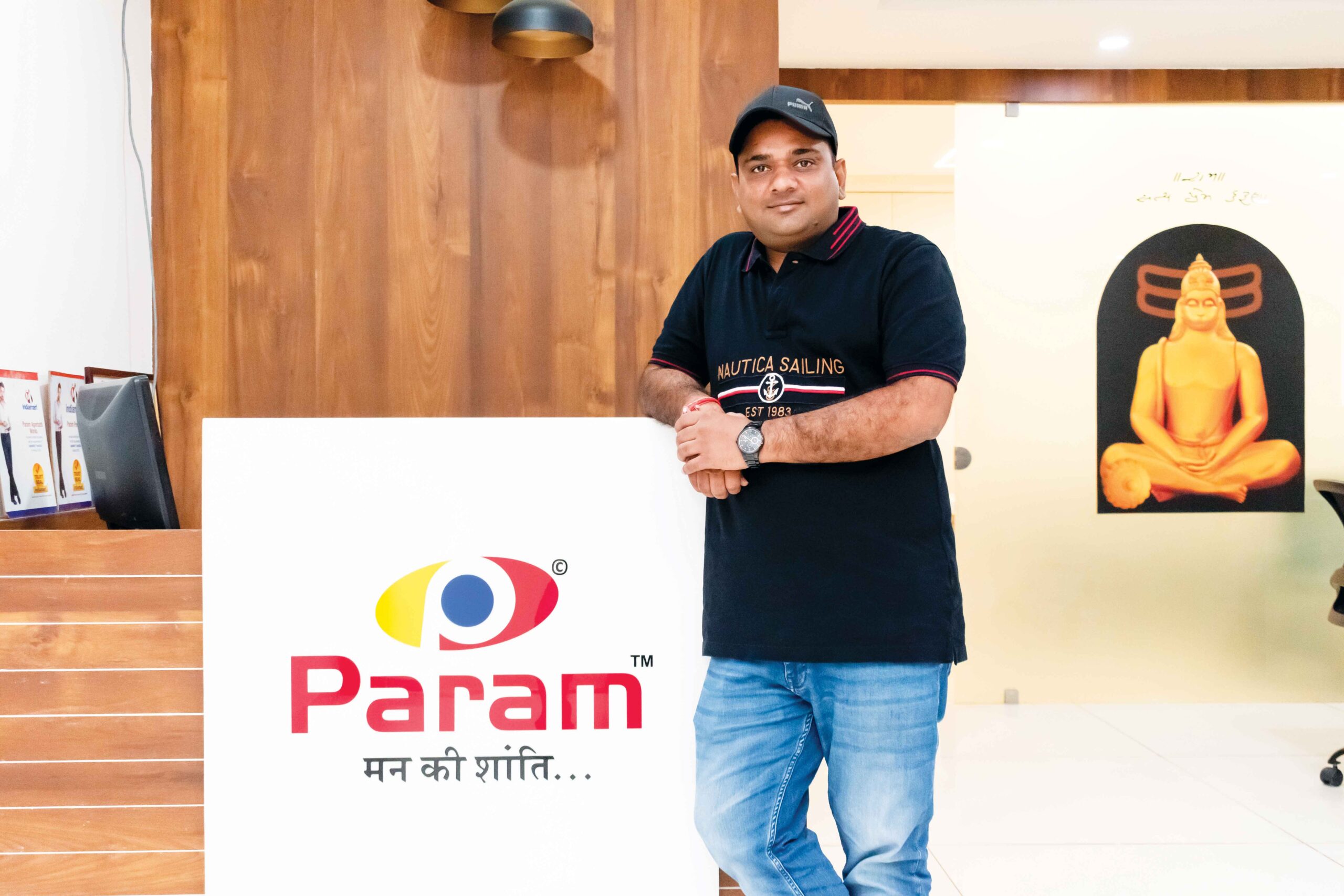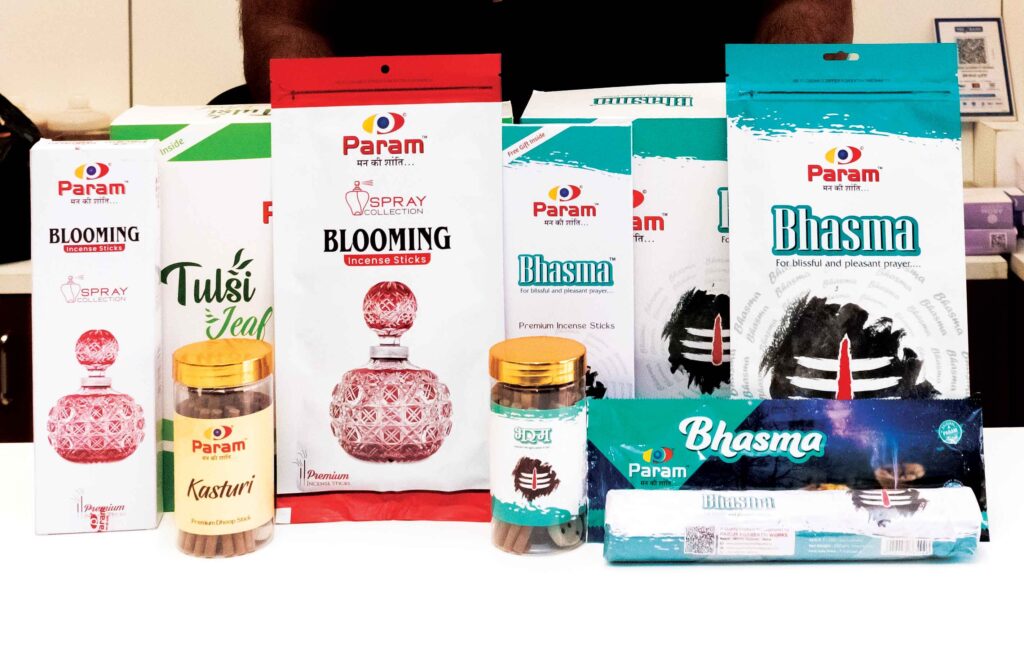
Param Agarbatti Aiming for National Presence: Keyur Patel
Rajkot-based Param Agarbatti Works, a leading brand from Gujarat, is making waves in markets across Maharashtra, Madhya Pradesh, Chhattisgarh, Odisha, West Bengal, Bihar, Assam, and the North East. The company offers an extensive range of products, featuring over 300 varieties of agarbattis, dhoop, sambrani, dry sticks, and cones, with prices ranging from ₹10 to ₹250. In an interview with Sugandh India, the head of Param Agarbatti, Mr Keyur Patel revealed that while the agarbatti industry is witnessing rapid growth, it is also facing significant challenges. Patel highlighted that this sector is heavily dependent on importing bamboo sticks and raw materials primarily sourced from China and Vietnam. This dependency has made it difficult for domestic manufacturers to control product costs. Moreover, ongoing global conflicts, including the Russia-Ukraine war and tensions in Israel, Iran, and Palestine, have led to a severe shortage of shipping containers, driving up transportation costs. These factors are putting additional pressure on manufacturers across the industry. Despite these obstacles, Param Agarbatti Works continues to expand its presence across India, aiming to meet growing domestic demand.

Founded in 2008, Param Agarbatti Works has steadily grown into a leading brand in the Indian incense industry. Initially, the company focused on dipping. However, in 2014-15, the business pivoted to manufacturing raw agarbatti, importing machines from Vietnam and supplying premix, sticks, etc. He explained that the entry of high-quality raw agarbatti from China and Vietnam posed significant challenges for local manufacturers, as the products offered similar quality with little difference in pricing. In response, Param Agarbatti launched its brand, “Param.” However, the timing coincided with the outbreak of the COVID-19 pandemic, which disrupted operations for two to three years.
Despite these setbacks, the market situation has since stabilised, and the business is now experiencing rapid growth. Currently, Param Agarbatti Works offers over 300 products, which have been well-received in the market. The company is expanding its presence across India, with a dedicated marketing team working to promote the brand on a pan-India scale. Patel noted that their product range, which includes zipper pouches, dry dhoop sticks, cones, sambrani cups, masala agarbatti, and hand-rolled agarbatti, is continuously evolving with new fragrances and variants, especially in the premium segment. Their growth trajectory reflects the increasing demand for quality incense products and Param Agarbatti Works’ ongoing commitment to innovation and market expansion.
He discussed the ongoing challenges his company is experiencing in sourcing raw materials for its products. He explained that although facilities for processing bamboo sticks were set up years ago, they haven’t succeeded due to the quality of domestic bamboo not up to the mark, which contains too many fibres and makes production difficult. These fibres hinder proper manufacturing on machines, making Chinese bamboo sticks a more viable option for production. Patel highlighted a significant issue with fluctuating prices. For example, the cost of bamboo sticks, which was ₹95 per kilogram, rose to ₹125 and is currently priced at ₹117. This volatility in raw material prices creates difficulties in adjusting the cost of finished products, leading to potential financial gaps for manufacturers. Additionally, Patel noted that the costs of other raw materials have also risen. DEP, which was priced at ₹115 per kilogram, has now increased to around ₹132, while T1 powder, which previously cost ₹21-22 per kilogram, is now priced at ₹27-28 per kilogram. While DEP is produced in India, its raw materials are imported from abroad, contributing to rising costs. The company is also facing labour shortages, both for machinery operations and manual tasks, driving up labour costs. Furthermore, the costs and availability of packaging, production materials, and machinery continue to fluctuate, adding to operational challenges. In addition, Patel pointed out that the global shortage of shipping containers, caused by ongoing geopolitical tensions such as the Russia-Ukraine war, has pushed up freight rates. With China holding the largest share of the global container fleet, much of its capacity is now being directed toward American routes, further impacting supply chains. Despite these hurdles, Param Agarbatti Works continues to innovate and expand its product offerings, focusing on overcoming these challenges and maintaining a competitive edge in the growing agarbatti market.

Param Agarbatti Works is preparing to make a significant impact in the market with the upcoming launch of its new wet dhoop product, “Sadhana.” Patel announced that the product will be available with an attractive promotional offer: customers who purchase 12 packets will receive an additional six packs free. The product, which is packaged in zipper pouches, will be sold at ₹20, with each pack containing 20 sticks. The MRP for “Sadhana” wet dhoop is ₹30, but the promotional scheme offers customers substantial savings. Patel also revealed that the company plans to launch a complete series of Sadhana wet dhoop products. In addition, they are introducing products in the 6 to 8-inch bamboo-less category, expanding their already established range of dhoop sticks. The brand has been manufacturing dhoop sticks for several years and is now preparing to take its products to new regions.ParamAgarbatti Works plans to launch in Rajasthan and Uttar Pradesh shortly, with a dedicated sales team working on the expansion.
In response to a question, Patel explained that Param initially entered the Chhattisgarh market, followed by Maharashtra, due to strong local connections and the rapid growth of the Chhattisgarh market. Before this, their products were already available in the North East. He further highlighted that Maharashtra, West Bengal, Odisha, and Chhattisgarh are the largest markets for agarbatti products, driven by festivals like Ganesh and Durga Puja, which see the highest sales volumes. These states also have a higher concentration of distributors. Regarding their marketing strategy, Patel shared that Param Agarbatti Works regularly holds distributor conferences, with the highest participation coming from these key states. This active engagement with distributors has played a crucial role in the brand’s rapid growth and expansion. As Param Agarbatti Works continues to innovate and expand its product offerings, it is positioning itself to strengthen its presence in the competitive Indian
agarbatti market. Param Agarbatti Works is prioritising premium quality in its product offerings, with most of its range crafted to meet high standards. He explained that while many consumers still seek affordable options, the majority of customers are increasingly focused on quality. The company plans to continue this focus on premium products moving forward. Patel highlighted that their best-selling product, Bhasm, is available in a price range of ₹10 to ₹200. This product line includes agarbatti, dhoop, and Muththa packs, with popular fragrances like Tulsi Leaf, Hina Kesar, and Kasturi. In addition, Param Agarbatti Works has launched a spray series, which has been receiving positive repeat sales. Looking ahead, Patel shared that the company plans to set up depots in various states across India to facilitate distribution and introduce new fragrances for their expanding product range. With the incense market being a large and competitive sector, there is always a demand for innovation, and Param Agarbatti Works intends to meet this demand with new and improved products. Over the past few years, the company has launched a range of 300 products that have already gained significant traction in the market. Patel also mentioned a shift in consumer preferences, noting that 15-20% of the market has moved from traditional agarbatti to dhoop sticks, cones, and sambrani cups. In response, Param Agarbatti Works is adapting its product offerings to meet this evolving demand, further expanding its presence in the market. As Param Agarbatti Works continues to innovate and expand, its commitment to quality and customer satisfaction remains at the heart of its strategy for sustained growth and market leadership.
Param Agarbatti Works is navigating an increasingly competitive market, with new manufacturers entering while some exit. Despite the challenges, founder Mr Keyur Patel believes that competition has led to positive developments in the industry, helping stakeholders—manufacturers, distributors, retailers, and customers—better understand the value of products. Patel views competition as essential for the market’s evolution. He shared that he spends 15-20 days each month visiting the market. This hands-on approach allows him to stay informed about new products entering the market and assess the performance of his offerings. Patel also discussed the brand’s export operations, revealing that Param Agarbatti products are currently being exported to 5-6 countries, including Bangladesh, Bhutan, Nepal, and the Gulf region. These markets have generated a significant number of repeat orders. However, Patel emphasised that the company is not keen on exports at present. Considering the size of the domestic market, he believes it will take another 20 to 25 years to quantify this demand. As such, their immediate focus is on establishing Param as a pan-India brand.



